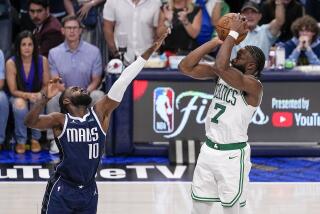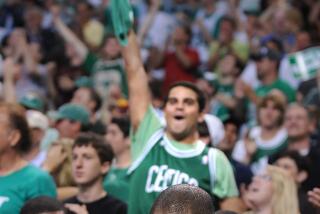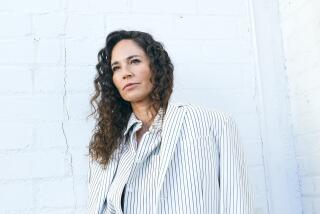There’s No Larry in Lineup
- Share via
BOSTON — Larry Bird is still around. He’s there, on the cover of the team’s 1992-93 media guide, in caricature, his arm around the Celtics’ leprechaun. He’s up there on the Garden rafters, in number form--or he’ll be there soon, anyway.
He’s there, on the sideline at practice, wearing one of his EBU (expensive but ugly) sweaters, watching a scrimmage. But he’s not passing, he’s not shooting.
“It is strange,” Celtics Coach Chris Ford said, “but we all knew it was coming at some point in time. He’s still around, he’s been to training camp, we still see him -- and sometimes he’s in a familiar pose, he’s just sittin’ over there.” Ford pauses to chuckle. “But that’s about it,” he said.
Bird, 35, probably did more sittin’ than playin’ the last two years of his career. Finally, on Aug. 18, Bird pointed at his back, said it was killing him and retired.
As of last week, he had yet to pick up a basketball since, even for just one shot.
Sure, he’s still around -- in the record book, sometimes on the sideline, soon in the rafters, always on video -- but really, he’s gone. What is Larry Bird without a basketball in his hands? He’s in the process of figuring that out as he performs his nebulous duties as special assistant to Dave Gavitt, the Celtics’ chief of basketball operations, and as a spokesman for Miller Brewing Co.
In the meantime, Kevin McHale said, “The torch is automatically passed because of the nature of the game. The game goes on whether you play or not, and that’s something I learned a long time ago.
“I mean, Michael Jordan probably never saw Wilt Chamberlain play. I go to schools now and ask kids about Dr. J and they don’t even know who he is. That’s the way it is, and that’s the way it should be. Old-timers cannot play this game.”
If you don’t know who Dr. J is, that’s McHale’s point.
This question looms: For one who had such an impact on the floor (21,791 points, 5,695 assists and 8,974 rebounds), what will be the impact now that Bird has retired?
Fans may feel a loss in their heart, but the biggest loss may be felt by ownership.
Tony Russ, a New York stock analyst who keeps track of The Boston Celtics Limited Partnership, said the value of the franchise was between $5 million and $7 million in 1978, the year before Bird arrived. Today, Russ said, its real worth is about $100 million, although an investor (or, as Russ said, a “sportsman”) might pay as much as $130 million with the hope of a longer-range return.
The Celtics cashed in on a unique opportunity when they slipped through a since-closed loophole and went public in 1986. Yet, drastic increases in the value of NBA franchises were not uncommon during the ‘80s.
That’s because the pre-Bird NBA was a drug-tainted league creeping precariously close to financial instability. Then Magic Johnson and Bird came along, and, most important, David Stern, a commissioner who knew how to market the stars, came along with them. Today, the league is enjoying an unprecedented worldwide popularity.
Bird’s retirement had a direct impact on the value of Celtics stock, which returned $2.25 a share a year ago. Earlier this week, the annual return was announced: $1.25. Russ said a balloon payment -- of $4 million -- on Bird’s contract was the chief reason.
But make no mistake: If the team’s primary owners were working strictly from a bottom-line viewpoint, they would rather pay out Bird’s salary ($5 million each of the next two seasons) and have him in uniform. Whether he could play or not.
“Since the day Larry came here, we sold out every game,” said another legend, Celtics President Red Auerbach. “Monetarily, that should give you an example of what he was worth. “See, Larry was not only a great, great, great player, but he sold tickets. And that’s very important.
“We have great players today, but we don’t know yet whether they can sell tickets or not. I think McHale and (Robert) Parish could; I think Reggie (Lewis) could in time. But Larry as a player, he just tickled the imagination of every fan that ever came into the building. He brought them. They came out to see what Larry would do next.”
As far as the basketball side of it, the Celtics have been learning to play without Bird for the better part of two years.
“Larry was an unbelievable presence when he was MVP of the league,” said Danny Ainge, a Phoenix Suns guard who played with Bird in the glorious mid-1980s. “But he wasn’t as big a presence as people would believe the last couple of years, when he was injured and in and out of the lineup.”
When Bird missed 22 games in 1990-91, Ford’s first year as coach, the Celtics won the Atlantic Division title. When Bird missed 37 games last season, the Celtics won the Atlantic Division title; without him, they went 15-1 down the stretch to overtake the Knicks, then won five of their first six playoff games.
“I did mention (life without Larry) at the start of camp,” Ford said. “It’s important that we know we still can win. We have a nucleus of players here who can win. But it’s going to take the kind of effort we had last season, in those last 20 games, where we were able to overcome the Knicks and win the division. We did it a lot without Larry.”
Now, they’re looking to do more. The Celtics are younger and quicker, and the coaches have been busy installing all kinds of wrinkles -- variances on their fastbreaks, assorted traps, etc.
“Actually, it has been kind of a thrill for me and for (fellow assistant) Don (Casey), too,” Jon Jennings said, “because we have all these ideas, and they float around in our heads all the time, and because Chris has been very receptive to our ideas. Of course, he’s got his own ideas.
“To me, it’s something very exciting. We’ve got the chance to use all these different players now, to put these ideas into effect and really see if they work.”
More to Read
Go beyond the scoreboard
Get the latest on L.A.'s teams in the daily Sports Report newsletter.
You may occasionally receive promotional content from the Los Angeles Times.










